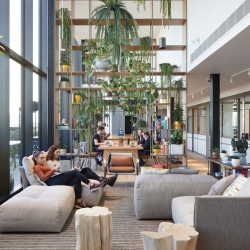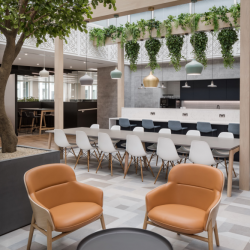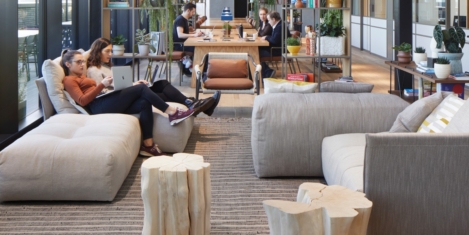January 10, 2022
Search Results for: decision making
December 15, 2021
Poor data means most property investors fail to consider human health
by Jayne Smith • Business, News, Wellbeing
 Property investors are not considering how the indoor conditions of a building will impact upon human health due to poor data, a new survey suggests. The ESG Data Challenge survey, which details the views of 121 real estate investors and professionals, claims there were serious issues in the quality of environmental, social governance (ESG) data being received, with many doubting its quality. (more…)
Property investors are not considering how the indoor conditions of a building will impact upon human health due to poor data, a new survey suggests. The ESG Data Challenge survey, which details the views of 121 real estate investors and professionals, claims there were serious issues in the quality of environmental, social governance (ESG) data being received, with many doubting its quality. (more…)
December 10, 2021
Artificial Intelligence to guide organisations through new challenges
by Jayne Smith • News, Technology
 The World Economic Forum published the “Human-Centred AI for Human Resources: A Toolkit for Human Resources Professionals” to scale the responsible use of artificial intelligence in Human Resources (HR). The toolkit includes a guide covering key topics and steps in the responsible use of AI-based HR tools, and two checklists – one focused on strategic planning and the other on the adoption of a specific tool. (more…)
The World Economic Forum published the “Human-Centred AI for Human Resources: A Toolkit for Human Resources Professionals” to scale the responsible use of artificial intelligence in Human Resources (HR). The toolkit includes a guide covering key topics and steps in the responsible use of AI-based HR tools, and two checklists – one focused on strategic planning and the other on the adoption of a specific tool. (more…)
December 6, 2021
We must wake up to the realities of workplace sustainability
by Oliver Cripps • Comment, Environment, Workplace design
 Sustainability has been steadily moving up the business agenda over the past few years, with COP26 placing more emphasis on the need for organisations to demonstrate that their operations are sustainable and lessening their overall impact on the planet. Many businesses may feel daunted by the challenges ahead, and there are certainly big steps that need to be taken in order to reduce corporate carbon footprints and move to more sustainable models. (more…)
Sustainability has been steadily moving up the business agenda over the past few years, with COP26 placing more emphasis on the need for organisations to demonstrate that their operations are sustainable and lessening their overall impact on the planet. Many businesses may feel daunted by the challenges ahead, and there are certainly big steps that need to be taken in order to reduce corporate carbon footprints and move to more sustainable models. (more…)
November 23, 2021
Wondering what to do about that office of yours? Hold the line.
by Louis Wustemann • Features, Flexible working, Property, Workplace design

At the end of April, New York magazine’s cover feature was headed ‘Remember the Office?’ The article reminisced about a world of cubicles and water-coolers, coffee points and staff parties. Its tone was elegiac, implying that it wasn’t just the enforced distance of 13 months of COVID-19 restrictions that lent enchantment to communal workspace, but the possibility that offices had gone for good.? (more…)
November 18, 2021
Time to stop playing around with the issue of workplace sustainability
by Joanna Knight • Environment, Facilities management, Features, JK, Workplace design
 The so-called green agenda, sustainability and climate change have finally hit centre stage. Various announcements are being made by UK Government and numerous high profile figures are crying a call to action to implement carbon reduction plans now. Lord Mayor of the City of London, Alderman William Russell, stated at the Annual Lord Mayor Gresham Lecture early in 2021: “Climate change is a bigger threat to the world than COVID-19.” He called on the financial and professional services sector to take urgent action to tackle climate change and ensure sustainability is at the heart of every financial decision. (more…)
The so-called green agenda, sustainability and climate change have finally hit centre stage. Various announcements are being made by UK Government and numerous high profile figures are crying a call to action to implement carbon reduction plans now. Lord Mayor of the City of London, Alderman William Russell, stated at the Annual Lord Mayor Gresham Lecture early in 2021: “Climate change is a bigger threat to the world than COVID-19.” He called on the financial and professional services sector to take urgent action to tackle climate change and ensure sustainability is at the heart of every financial decision. (more…)
November 17, 2021
Post-pandemic surge in demand for sustainable business travel
by Jayne Smith • Environment, News
 New research from Trainline Partner Solutions (TPS) claims Covid-19 will usher in a new era of sustainable business travel. The vast majority of business travellers (75 percent) want to reduce their reliance on air travel for business because of the impact it has on the environment. (more…)
New research from Trainline Partner Solutions (TPS) claims Covid-19 will usher in a new era of sustainable business travel. The vast majority of business travellers (75 percent) want to reduce their reliance on air travel for business because of the impact it has on the environment. (more…)
November 11, 2021
Majority of employees lack confidence in their company’s return-to-work strategy
by Jayne Smith • News, Wellbeing, Working lives
 Humanyze has released the second installment of the 2021 Future of Work Report, a holistic analysis of the evolution of work throughout the pandemic and employee sentiments about the post-pandemic future of the workplace. Nearly 2,300 survey responses were collected from individual employees and people managers, and compared to responses from the spring 2021 report, to identify key changes over the last 6 months. (more…)
Humanyze has released the second installment of the 2021 Future of Work Report, a holistic analysis of the evolution of work throughout the pandemic and employee sentiments about the post-pandemic future of the workplace. Nearly 2,300 survey responses were collected from individual employees and people managers, and compared to responses from the spring 2021 report, to identify key changes over the last 6 months. (more…)
November 10, 2021
Majority of people are overwhelmed by data at work
by Jayne Smith • News, Wellbeing, Working lives
 People in the UK feel overwhelmed by the amount of data available to them when making critical decisions at work, according to a new study by Oracle NetSuite. The study, which includes insights from 2,000 people across the UK, France, Germany, Italy, Spain, Benelux, Nordics and the Middle East, claims that while people believe they have the data to be successful, they are overwhelmed by data quantity and plan to turn to a robot or machine to assist in the decision-making process during the next 12 months. (more…)
People in the UK feel overwhelmed by the amount of data available to them when making critical decisions at work, according to a new study by Oracle NetSuite. The study, which includes insights from 2,000 people across the UK, France, Germany, Italy, Spain, Benelux, Nordics and the Middle East, claims that while people believe they have the data to be successful, they are overwhelmed by data quantity and plan to turn to a robot or machine to assist in the decision-making process during the next 12 months. (more…)
November 8, 2021
Are businesses suffering the vacancy effect?
by Jayne Smith • Business, Flexible working, News
 As businesses weigh up the pros and cons of remote working, a new white paper, produced by Oktra, reflects on how attitudes have changed over the last eighteen months. In summary, the paper concludes that working from home is generally fine if you’re older, wealthier, male and established in your career. Others may struggle. (more…)
As businesses weigh up the pros and cons of remote working, a new white paper, produced by Oktra, reflects on how attitudes have changed over the last eighteen months. In summary, the paper concludes that working from home is generally fine if you’re older, wealthier, male and established in your career. Others may struggle. (more…)
October 6, 2021
Disconnect between executives and employees on returning to the office
by Jayne Smith • Flexible working, News, Working culture
 Future Forum, a consortium launched by Slack to help companies reimagine work in the new digital-first workplace, has released the latest findings from the Future Forum Pulse, a global study that claims a huge divide between executives and non-executives on returning to the office: “the Great Executive-Employee Disconnect.” (more…)
Future Forum, a consortium launched by Slack to help companies reimagine work in the new digital-first workplace, has released the latest findings from the Future Forum Pulse, a global study that claims a huge divide between executives and non-executives on returning to the office: “the Great Executive-Employee Disconnect.” (more…)






 Research from?
Research from?

















January 4, 2022
Hybrid working will demand leaders develop new communication skills
by David Mills • Comment, Flexible working